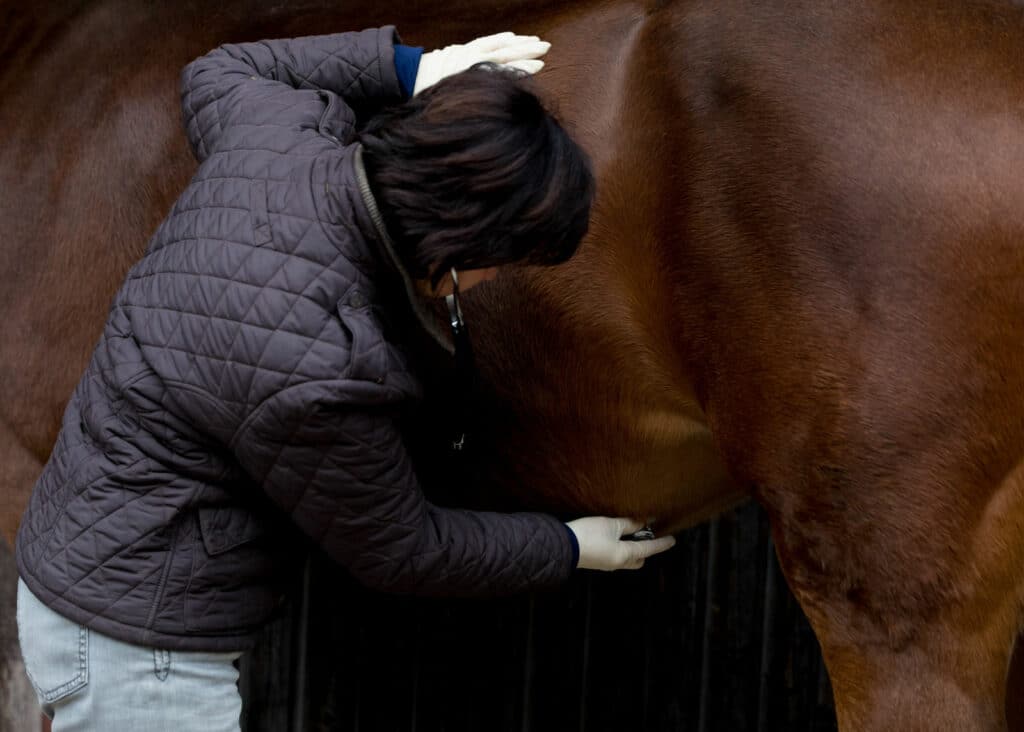In Monday Myths we debunk common misconceptions about a range of topics regarding equine digestive health and care. These are real statements made by real horse people. Have a question or topic you would like to see covered? Submit your idea here.
Statement: I was so surprised when my vet diagnosed my horse with colonic ulcers. She’s so laid-back!
Today’s myth discusses the commonly-held belief that only nervous, high-strung horses get ulcers. Stress is often listed as the primary cause of ulcers in horses; it’s supposedly related to a horse’s naturally high-strung temperament, or the stress induced by travel, competition, relocation, and more.
While stress has been shown to lower a horse’s immunity and make it more susceptible to illness, it is not a direct cause of ulcers. Because there are many factors at work to cause ulceration in the equine gastrointestinal tract, any horse of any temperament may suffer from ulcers.
Factors that Lead to Ulcers in Horses
Horses are designed to have a near-constant intake of fibrous foods (forages like grass, hay, chaff, etc) and get most of their energy from the fermentation of this food in the hindgut. Elements of modern horse care – factors of necessity and/or convenience – work against this natural functioning and may create a digestive environment that suffers from illness, including ulcers:
- Limited turnout (less than 18 hours per day)
- Fed concentrates (processed grains, pellets, sweet feed)
- Fed only 2-3 large meals per day (periods of time with nothing to eat)
- Exercised regularly, especially rigorously
If a horse meets even one of these criteria, it is at risk for suffering from a compromised digestive system, including hindgut acidosis, ulcers, and colic.
Calm Horses at Risk for Ulcers Too
Laid-back horses in particular tend to be more stoic when faced with stressful situations and/or discomfort – so just because a horse doesn’t show the classic signs of digestive upset doesn’t mean that it isn’t suffering. In fact, it’s well-proven in veterinary medicine that laid-back horses usually begin showing symptoms when a disease is more advanced. It can be difficult to distinguish between a naturally calm horse versus a lethargic sick one, so in case of a sudden change in behavior (even if calmer is better) involve your veterinarian.
Additionally, a low-grade GI tract condition may affect the horse’s ability to absorb nutrients fully – so a calm horse may actually be exhibiting an unhealthy energy or nutrition deficiency. The average healthy horse handled appropriately should be calm yet alert, responsive but not explosive.
Why Nervous Horses are Prone to Developing Ulcers
So why is it a commonly held belief that only nervous horses get ulcers? Their susceptibility does increase for two reasons: 1. the immune system is compromised when stressed and 2. they are more likely to go off their feed, pick at their hay, and stop drinking when they are subjected to a potentially stressful situation.
Research has shown that upwards of 90% of performance horses may suffer from ulcers – no matter their temperament. Learn more about what you can do to treat and prevent ulcers in horses.
Only high-strung horses get ulcers = myth. Because the digestive environment is influenced primarily by what and how a horse eats, ANY horse can be at risk for developing ulceration or other GI conditions.



